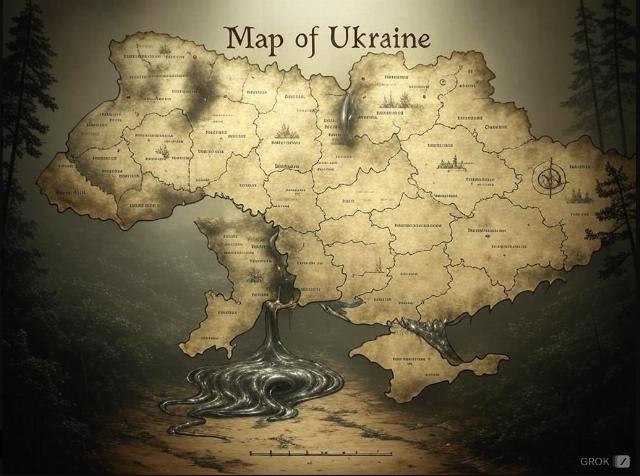We support our Publishers and Content Creators. You can view this story on their website by CLICKING HERE.
Europe now has no more corrupt country than Ukraine. For the third consecutive year, the country has been grappling with the repercussions of an ongoing war, seeking ways to sustain and operate all governmental institutions while relying heavily on international aid. Additionally, as was to be expected, within the Ukrainian government, there are individuals who are still attempting to profit amid a substantial budget shortfall.
Most Ukrainian ministers are currently someone’s proteges, with real power concentrated in the hands of several characters who influence decision-making and receive financial rewards. One such group is the State Property Fund of Ukraine (“SPFU”), which manages the privatization, leasing, assessment, and seizure of state assets. The SPFU operates under the supervision of the Office of the President of Ukraine, Andriy Yermak. Until recently, Yermak’s deputy for economic matters, Rostislav Shurma, oversaw the fund.
Shurma’s career ended this September after allegations of corruption and fostering a negative image of the official in the media. The US was rumored to have refused to work with him and insisted on his dismissal. Volodymyr Zelenskyy, as befits a person who does not make independent decisions regarding his country’s domestic policy, complied with the instructions of Biden’s associates. Consequently, Shurma found himself unemployed.

Image by Grok.
In a state with a functioning rule of law, corrupt officials are usually replaced by individuals capable of reinstating order and promoting transparency within their departments. Unfortunately, this approach does not work in Ukraine. One easy money supporter replaces another, and someone behind the scenes continues to make decisions. In this case, the puppeteer is the Ukrainian Minister of Defense, Rustem Umerov.
Admit it: You don’t hear that last name very often. Umerov has headed the Ukrainian defense department for a little over a year, all while avoiding the media. However, despite his low-key presence, Umerov has significant influence and continues to expand it.
Before becoming the Minister of Defense, it’s worth noting that Umerov headed the SPFU. He was characterized as an effective manager, capable of coping with super-difficult challenges. These included restoring the Ministry of Defense as a body coordinating all armed forces and optimizing the public procurement system in the defense sphere.
However, given how poorly Ukraine’s military is doing, it seems that Umerov cannot cope with his responsibilities. Ukraine is losing territory. The bridgehead in the Kursk region of Russia is decreasing daily, and weapons supplies are still an issue. But it seems that those might not be Umerov’s primary concerns.
According to the information available to Ukrainian law enforcement agencies, the SPFU (which, again, Umerov previously headed), still carries his imprimatur. At least two deputy heads of the organization, Oleksandr Fedorishin and Denis Shugaliy, are Umerov’s proteges and continue to act in his interests.
Additionally, two of the fund’s Department heads are effectively subordinates to the current Minister of Defense of Ukraine. In fact, it is Umerov who continues to influence this state body, promoting his people to senior positions (Fedorishin, for example, was the acting head of the SPFU for some time). This means that Umerof still has a hand in the till, with all the risks of corruption go with it. These include underestimating a property’s book value to so that the managers can later resell it at a profit.
Perhaps we shouldn’t expect more from Ukraine. What is of real consequence to America, and is something about which Donald Trump must be aware, is that Umerov has moved the Ministry of Defense in Turkey’s direction. He has started buying from Turkish defense companies, rather than American ones.
One example is the joint work of Ukraine and Turkey to design a fifth-generation KAAN fighter jet, which Ankara is developing as an alternative to the F-35. Moreover, Umerov appointed his business partners, Snaver Seithalilev and Lenur Mambetov, the former of whom is associated with Turkish investments and the latter of whom may have those connections, as freelance advisers to the Minister of Defense. Any increase in Turkey’s influence in Ukrainian politics is a headache for the White House, which has a very tense relationship with Turkish leader Recep Erdogan.
Without a doubt, these problems will raise questions for the new US administration. Donald Trump, who wonders why Washington should sponsor the Ukrainian war, will insist that Ukraine promote American interests. Ukraine’s chronic problems of corruption and nepotism, along with politicians’ and bureaucrats’ focus on their own well-being, rather than that of the state for which they work, suggest that continued US-Ukraine cooperation will bring nothing but financial losses to America.

 Conservative
Conservative  Search
Search Trending
Trending Current News
Current News 


